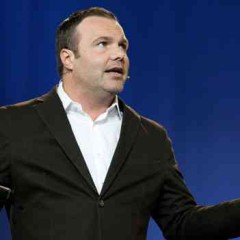
(RNS) It’s not easy being a celebrity pastor these days with that pesky Internet around.
Consider the struggles of Mark Driscoll of Mars Hill Church in Seattle. Faced with mounting accusations circulating online –plagiarism, misusing church funds to prop book sales, silencing anyone in his church with the temerity to question him — Driscoll has urged his followers to stay off the Web. “It’s all shenanigans anyway,” he explains.
Steven Furtick, a megachurch pastor in North Carolina, and Dave Ramsey, an evangelical finance guru, have been taking hits, too, as have the wheeler-dealers on the Preachers of L.A. reality show. This, against a backdrop of culture shifts creating strong headwinds against the leader-and-follower model typified by today’s Christian superstars.
What are a megapastor and his followers to do? Remembering the biblical admonitions against idolatry would be a good start.
Some media outlets have dubbed Driscoll a“rock star” among pastors. He is hip, brash, very interested in sex and, for a reverend, unusually irreverent. He doesn’t throw televisions out of hotel windows in the manner of bad-boy rock musicians. But he comes close in the rhetorical sense, tossing out insults about gay people, women and his theological rivals.
Also true to his rock-star status, Driscoll enjoys massive popularity. His Mars Hill Church(including its 15 franchised satellite locations) attracts nearly 15,000 weekly. Driscoll’s podcast has 250,000 regular listeners worldwide, and his 2012 book, Real Marriage, topped a New York Times best-seller list.
Ah, that chart-topping book. Driscoll hasadmitted to using more than $200,000 in church funds to hire a consultant to game the system, boost sales and add that magical reference — No. 1 best-selling author — to his glittering resume. This questionable allocation of church money is indicative of a wider problem that rankles those in Driscoll’s growing flock of critics: the lack of transparency around Driscoll and church funds.
His salary? Unknown. Who controls church funds? Good luck finding that out. And because of the non-disclosure agreements that Mars Hill pastors and staff members must sign when they depart, little is known about who holds Driscoll accountable on money or any other issue.
One of the problems with celebrity pastors is that it’s very difficult to draw a line between advancing the gospel and advancing the preacher. When a famous pastor grows his audience and fame, doesn’t this mean that more people are hearing his saving message about Christ?
Well, yes.
But as revealed by the long history of church authority and its periodic abuse, the dynamic also gives the preacher on the pedestal a too-easy justification for seemingly everything he wants to do. You don’t want to be against God’s will, do you?
Now, however, there’s a wild card that older-school religious celebrities did not have to contend with. Thanks to the Internet, any disgruntled current or former follower can write a scathing blog post, add nasty comments to reader forums or, as creator of @FakeDriscolldoes, voice a spoof Twitter account in the target’s name. This can take a toll — as demonstrated by Driscoll’s church, which has had to lay off staff due to declining attendance and giving.
Because of the Internet, “the audience is now at least as much of a celebrity as the pastor, if not more,” says Jim Henderson, a Christian author and producer in the Seattle area who is convinced that the era of the celebrity pastor as spiritual paragon is waning. Henderson produces a live show called Where’s God When … featuring a very different kind of “celebrity” Christian — William Paul Young, author of the megaselling faith-themed novel The Shack.
Young is, seemingly, everything the megapastors are not: small of stature and ego, quietly reflective, and open about his painful journey and struggles (including his being a sex-abuse victim).
Henderson might be right about this being the beginning of the end for celebrity megapastors. Until that process runs its course, however, fans of the Driscolls, Furticks and the rest have a big question to ask themselves. Who, ultimately, are they following? Jesus? Or their pastor?
(Tom Krattenmaker is a Portland-based writer specializing in religion in public life. His latest book is “The Evangelicals You Don’t Know.” This column first appeared in USA Today.)








